State Map on Immigration Enforcement
This map focuses on state laws that regulate the state’s involvement in immigration enforcement. The map looks at what these policies do, where they are, where they aren’t, and what is left open.
The Department of Homeland Security detains and deports hundreds of thousands of immigrants every year. The massive immigration enforcement regime has devastating effects on immigrant families and communities. The Immigrant Legal Resource Center (ILRC) has been at the forefront of campaigns locally and nationally to fight back against immigration enforcement and protect immigrant rights.
The ILRC provides resources and support to communities and organizations working on immigration enforcement issues, including background explanations, strategy tools for campaigns, legal and policy analyses, and ongoing assistance to campaigns fighting against unfair immigration enforcement.
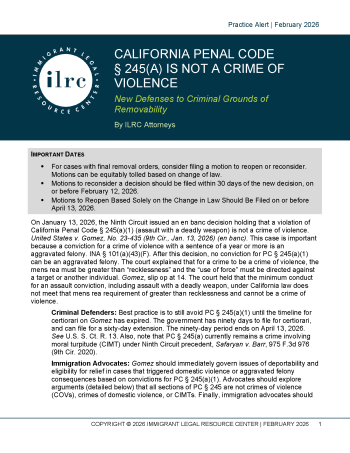
On January 13, 2026, the Ninth Circuit issued an en banc decision holding that a violation of California Penal Code § 245(a)(1) (assault with a deadly weapon) is not a crime of violence. United States v. Gomez, No. 23-435 (9th Cir., Jan. 13, 2026) (en banc).
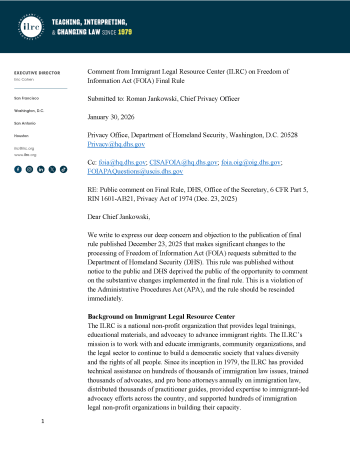
ILRC submitted this comment to DHS opposing recent changes to FOIA rules effective January 22, 2026 that restrict public access. DHS published a final rule in violation of the Administrative Procedures Act by unlawfully bypassing public notice and comment. The rule eliminates paper filing of FOIA requests and allows DHS in its discretion to administratively close requests that it deems to insufficiently describe the records sought.
The U.S. Department of Justice has issued a new rule that changes how immigration appeals are handled. The new rule shortens the time you have to appeal—which is how you ask for another court to review an unfavorable decision from an immigration judge.
This guide offers practical answers to common questions, so community members can feel more prepared and confident when facing interactions with federal immigration enforcement officials. The guide also highlights specific details concerning Texas and Californian residents.
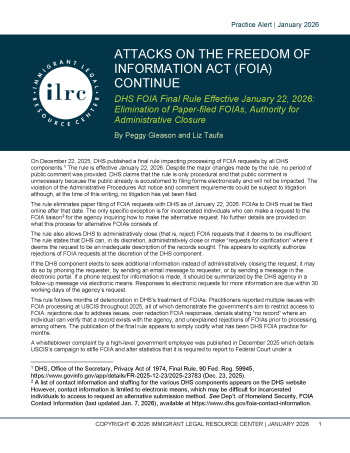
On December 22, 2025, DHS published a final rule impacting processing of FOIA requests by all DHS components. The rule is effective January 22, 2026. Despite the major changes made by the rule, no period of public comment was provided. The rule eliminates paper filing of FOIA requests with DHS as of January 22, 2026. FOIAs to DHS must be filed online after that date. The rule also states that DHS can, in its discretion, administratively close or make “requests for clarification” where it deems the request to be an inadequate description of the records sought.
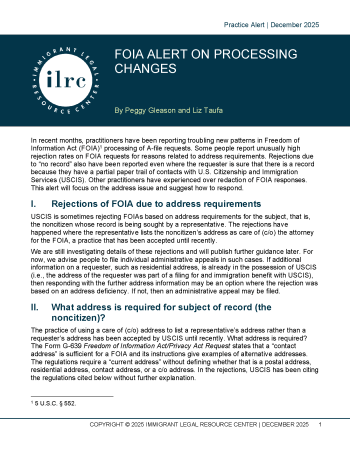
In recent months, practitioners have been reporting troubling new patterns in FOIA processing of A-file requests. Some people report unusually high rejection rates on Freedom of Information Act (FOIA) requests for reasons related to address requirements. Rejections due to “no record” also have been reported even where the requester is sure that there is a record because they have a partial paper trail of contacts with USCIS. Frequent over redaction of FOIA responses also has been reported. This alert discusses the address issue and suggests how to respond.
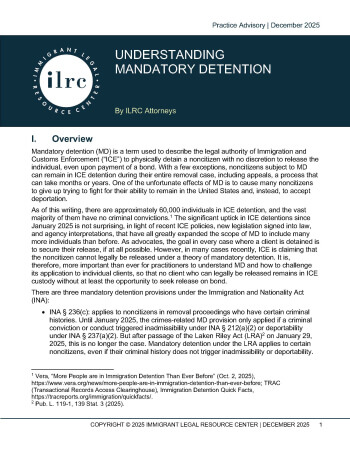
This advisory explains each of the three statutory grounds for mandatory detention, and defenses and strategies that advocates can use to challenge the designation. It discusses the Laken Riley Act of 2025, the BIA’s decisions in Matter of Q. Li and Matter of Yajure Hurtado, and the current state of national litigation challenging ICE’s expansive use of mandatory detention.
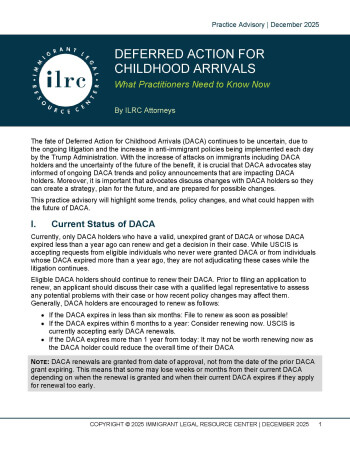
This practice advisory will highlight some trends, policy changes, and what could happen with the future of DACA.
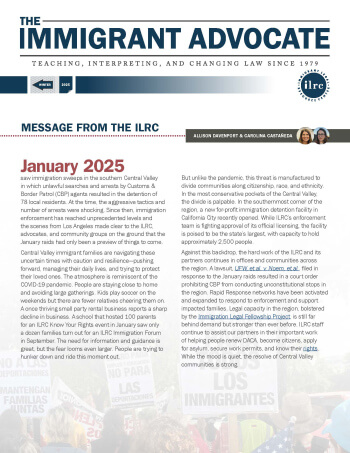
Our 2025 winter edition of the newsletter. In this issue: In this issue: Message from the ILRC, Red Cards: Protecting Immigrants Since 2006, Texas Updates from Laredo & Houston, 2025 Burton Awards: Celebrating Together.
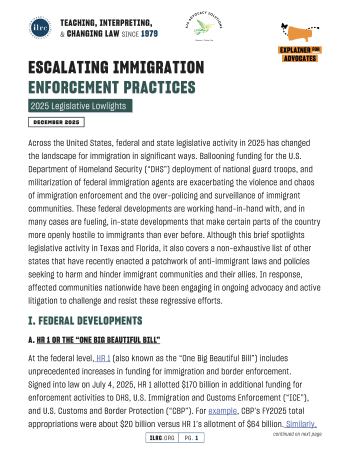
This brief spotlights legislative activity in Texas and Florida, it also covers a non-exhaustive list of other states that have recently enacted a patchwork of anti-immigrant laws and policies seeking to harm and hinder immigrant communities and their allies.
Information about these agreements and the rights of asylum seekers in immigration court proceedings if the government makes this argument in an immigration court hearing.
From October 3-7, 2025, Goodwin Simon Strategic Research surveyed a statewide representative sample of 1,213 registered voters. The poll explored voter attitudes towards mass deportation, recent ICE actions, and sanctuary protections in the state. Uniquely, this poll explores key themes that may be driving Californians’ growing disapproval of mass deportation, including revealing voters’ strong support for due process, including for people with past records, and equal treatment in the legal system, regardless of immigration status. Voters also expressed deep concern with the cost of the Trump administration’s approach to immigration on taxpayers.
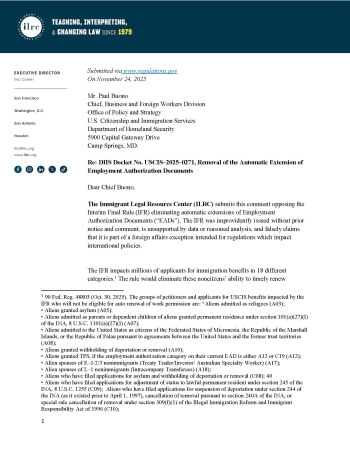
ILRC submitted this comment on November 25, 2025 opposing the Interim Final Rule (IFR) eliminating automatic extensions of Employment Authorization Documents (“EADs”). The IFR was improvidently issued without prior notice and comment, is unsupported by data or reasoned analysis, and falsely claims that it is part of a foreign affairs exception intended for regulations which impact international policies.
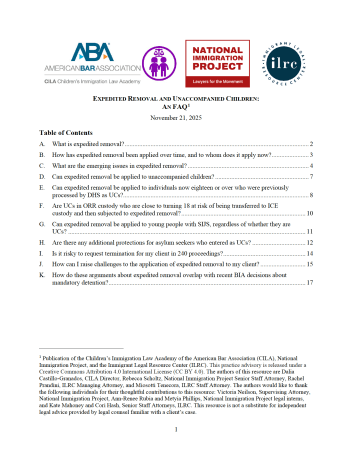
This resource – created with our partners at the Children’s Immigration Law Academy and National Immigration Project – answers common questions about expedited removal and its application to children and offers arguments against its application to young people who were processed as UCs and young people with approved special immigrant juvenile status (SIJS), should the government attempt to apply it to those groups.
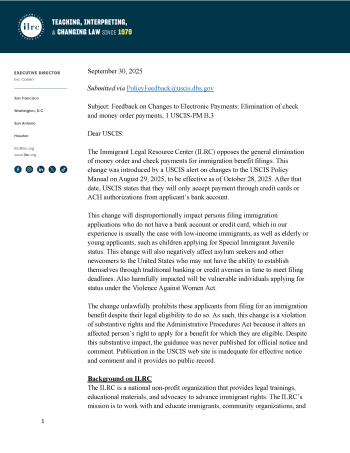
The Immigrant Legal Resource Center (ILRC) opposes the general elimination of money order and check payments for immigration benefit filings. This change was introduced by a USCIS alert on changes to the USCIS Policy Manual on August 29, 2025, to be effective as of October 28, 2025. The new guidance states that all applications filed October 28, 2025, or after must pay by ACH bank account payment, credit or debit card, or pre-paid card. No bank checks, certified checks, personal checks or money orders will be accepted thereafter.
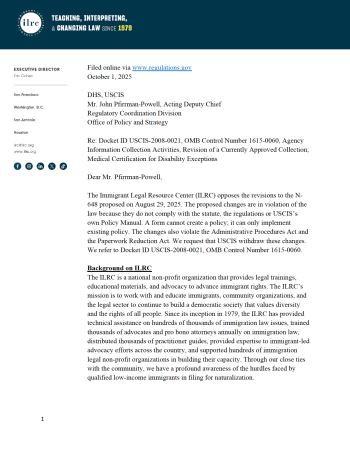
On September 30, 2025, ILRC submitted this comment to USCIS to oppose the proposed changes to the N-648 and request that they be withdrawn. The changes create a series of substantial obstacles for naturalization applicants applying for a disability waiver of the English/civics requirement. The proposed changes create a form more than twice the length (10 pp.) of the current form (just over 4 pp.) that creates an undue burden on applicants and the medical professional who must complete the N-648. It also doubles the burden of time for USCIS adjudicators who must review this form.
The barrier that these changes would pose is prejudicial to eligible waiver applicants. Standards expressed in the revised form are outside any guidance provided by the statute, regulations and USCIS Policy Manual. The form purports to create law and invents barriers to eligibility in areas where no such law has been established by legitimate guidance.
The barrier that these changes would pose is prejudicial to eligible waiver applicants. Standards expressed in the revised form are outside any guidance provided by the statute, regulations and USCIS Policy Manual. The form purports to create law and invents barriers to eligibility in areas where no such law has been established by legitimate guidance.
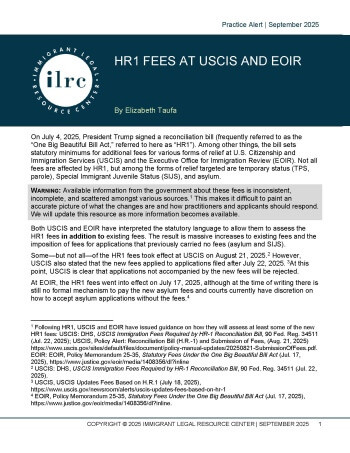
This practice advisory provides information about recently implemented fee increases at USCIS and EOIR. These fee increases are a result of the “One Big Beautiful Bill Act” also known as HR1. This advisory explores what we know and what we still don’t know about the fees, how to pay them, and potential future changes.
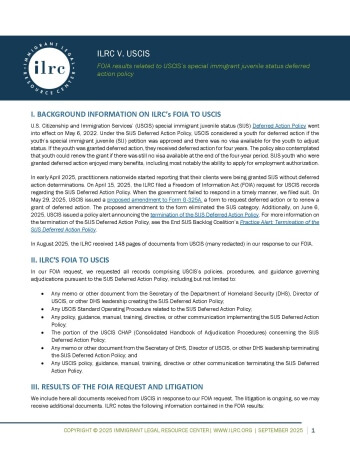
On April 15, 2025, the ILRC filed a Freedom of Information Act (FOIA) request for USCIS records regarding the SIJS Deferred Action Policy. When the government failed to respond in a timely manner, we filed suit. This resource includes all documents we have received from USCIS as a result of the FOIA request, as well as a short summary of the request and results.
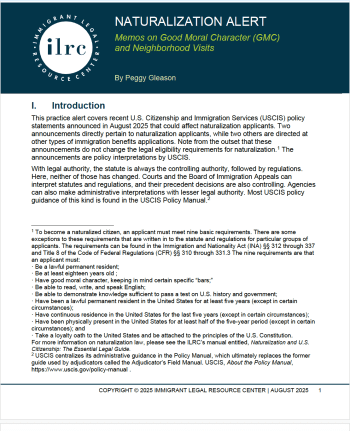
This practice alert covers recent U.S. Citizenship and Immigration Services (USCIS) policy statements announced in August 2025 that could affect naturalization applicants.
On July 28, 2025, the ILRC submitted a comment opposing a new government rule that imposes massive civil fines—sometimes up to nearly $2 million—on immigrants who entered the U.S. without authorization or did not leave after a removal order.
On July 28, 2025, the ILRC submitted a comment opposing a new government proposal to add extra questions to nine immigration forms, including applications for naturalization, asylum, and green cards.
On July 24, 2025, the ILRC submitted a comment strongly opposing the government’s proposed changes to Form G-325A and related policies that end protections for three vulnerable groups: young people with Special Immigrant Juvenile Status (SIJS), stateless individuals, and immigrant workers in the Deferred Action for Labor Enforcement (DALE) program.
The ILRC strongly opposes new U.S. Citizenship and Immigration Services (USCIS) policy changes that end deferred action for youth approved for Special Immigrant Juvenile Status (SIJS).
On July 16, 2025, ILRC submitted a comment opposing a new U.S. Citizenship and Immigration Services (USCIS) policy that allows the agency to use “derogatory information” against immigration applicants without always disclosing it.
On July 7, 2025, the ILRC submitted a comment opposing a new federal rule that changes how the Office of Refugee Resettlement (ORR) handles unaccompanied children.
ILRC Resources on 287(g)
Check out our map of 287(g) agreements and various resources to fight 287(g) in your community.
National Map of Local Entanglement with ICE
A map showing the degree to which local policies limit assistance in immigration enforcement
